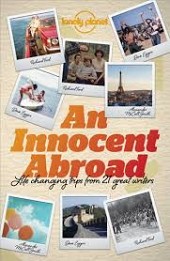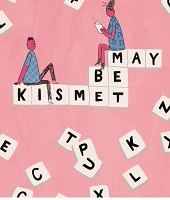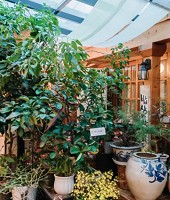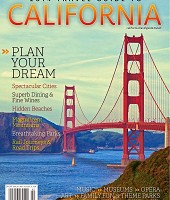
Lonely Planet’s An Innocent Abroad anthology: “Stolen”
by Lavinia Spalding (google+)The voice was booming, packed with obscenities, and deep—almost supernaturally deep. It was unlike any sound my lungs had ever produced. But there was no time for contemplation. It was 2 a.m. in Busan, South Korea, and an intruder was in my living room.
The instant I unlocked my front door and spotted him crouched behind the sofa, the primal, deep-voice response activated. Then, after one suspended moment, he launched himself at me. I sprang back flat against the wall, and he was in front of me. Korean, lanky, wearing a black nylon jacket and baggy pants. I braced for the attack, but he ricocheted against me, shot into the hall, and tumbled two long flights of steps to the street. I slammed and deadbolted the door, my hands shaking. Then I heard his feet slapping the pavement outside.
I flipped open my cell phone and stared at it. My hangul wasn’t fluent enough to explain anything to the police tonight, and it was too late to call my Korean friends. My French boyfriend lived across the world in New Mexico, and we were in a fight anyway—edging toward breakup. Finally I dialed Marnie. I had put her in a cab ten minutes before, and she lived clear across Busan, near our university; she wouldn’t be home yet.
I heard her ask the driver to turn around.
“I’ll stay the night with you,” she offered.
“Thanks,” I said, finally taking a normal breath. “But remember I told you my pipes burst? There’s no heat in my apartment. It’s freezing.”
It was only the second week of January, and already I hated this year.
#
Two weeks earlier, on the island of Koh Samui in Thailand, I was sharing a songthaew—a covered pickup truck with open sides and two long benches in back—with six strangers. It was another sweltering day, and my legs clung to each other like saran wrap. After two weeks of lounging on Thai islands, I was en route to catch a ferry to lounge on Malaysian islands. I also had loose intentions of visiting the Petronus Twin Towers (then the tallest buildings in the world), staying in historic Melaka, and exploring the Cheong Fatt Tze Mansion in Georgetown. But my only solid plan was to hit the American embassy in Kuala Lumpur and add pages to my passport.
After many years of travel, my little blue book—my most cherished possession—was fat with colorful stamps and visas and memories, and it could take no more. I’d need supplemental pages before crossing any borders that required a full-page visa, and though I had no specific plans, the likelihood of that happening soon was high.
My job in Korea, teaching ESL at a university, was the stuff of expat dreams—a generous salary for working 12 hours a week, a serene mountain campus, students so respectful they bowed from the hip when they saw me at the cafeteria, and five months of paid vacation metered out as a week here, twelve days there, a month, six weeks. I didn’t believe in staying home during a paid vacation, so I existed perpetually in four stages: planning, leaving, gone, returning. But Malaysia would be my first solo trip.
When the songthaew arrived at the dock and pitched to a stop, I stood up, crouched over, and reached for my purse. I usually wore a money belt, but for this trip I’d opted for a cute travel purse slung over my sunburned shoulder. A cute travel purse containing all my money, credit cards, and plane tickets, as well as my passport. A cute travel purse I must have left in the guesthouse café across the island, where I’d just said a teary goodbye to my best friend and her boyfriend. The songthaew driver was waiting for me to pay.
“My bag’s gone,” I announced to the truck, looking beseechingly between impassive backpackers and locals. “Can someone lend me money for the fare?”
A songthaew, one of the cheapest transportation options in Thailand, is not where one goes to find magnanimous benefactors. They looked at me sideways.
“Please?” I begged.
Finally a wiry American in a sweat-stained shirt with Thai script fished twenty baht, forty cents, from his pocket. “Thank you so much,” I gushed—he had seriously saved my life, I said. He rolled his eyes and looked away.
Back at the guesthouse, I found Erin and Drew sipping Singha beers at the plastic table where we’d eaten breakfast an hour before. They were due to leave any minute for Koh Tao, to become dive certified before moving to Canada. Erin paid my tuk-tuk driver while Drew and I searched the café in vain. Could I have left it, I wondered, in the songthaew, for God’s sake? Then their driver arrived.
“We have to go,” Erin said. “I’m sorry.” She shoved all her baht in my hand, hugged me, and was gone.
That whole week I stayed on Koh Samui. Twice I visited the police chief. Twice he instructed me to stay put. “You leave, will be difficult,” he said, scribbling a few more indecipherable notes on my police report before handing it back across his desk with a reassuring nod. “You wait few more day.”
In a fluorescent Internet café I researched Bangkok addresses: the American embassy, the Korean embassy, the Korean Air office, the post office where I’d pick up funds my mother would wire. And I instant-messaged my French boyfriend in New Mexico who was helpful with research, but increasingly less helpful in the emotion department. A single dad, he’d chosen this week to arrive at the realization that he’d been neglecting his ten-year-old daughter during our intense long-distance love affair. She required more attention, so I got less.
I watched other backpackers arrive and leave, arrive and leave. I walked the island, scribbled in my journal, lay in my hammock, and spent as little of Erin’s baht as possible. But mostly I sat by the sea, raking sand through my fingers and wondering how, after all my travels, I had become such an amateur. Wondering how, after all my eagerness to travel alone, I had so quickly come to despise it.
#
In Busan, I hung up with Marnie and perched on the edge of my mattress, waiting for her footsteps on the stairs. I knew I should search my apartment to see if anything was missing. If I discovered the intruder had stolen something, I’d feel better. I’d know he was just a thief, nothing worse. But I couldn’t move. In five years I had never felt fear in Busan, not even walking home alone in the middle of the night. I hardly ever glanced over my shoulder—guns were illegal in Korea, and violence was scant. I’d never felt anything but safe. Until now.
#
After one week on Koh Samui, against the police chief’s advice, I left.
“I’m sorry you give up,” he said, looking genuinely disappointed in me. I booked a flight to Bangkok (which they miraculously let me board, accepting my police report as identification), and arrived depressed to begin the process of reclaiming my identity.
Khao San Road, the main tourist drag, is a despicable place for someone who doesn’t want to be in Bangkok—someone who has logged more than enough time in Bangkok, someone who was this close to her first big solo adventure. Khao San Road is a chaotic vortex of tacky consumerism, dirty hostels, sleazy bars, and soulless cafés. Forget ugly Americans; Khao San Road is where tourists from all great nations converge to get ugly, to haggle over pennies and fall down blitzed in broad daylight. I hated Khao San Road and it was the last place I wanted to be.
“Khao San Road,” I told my tuk-tuk driver.
I would splurge, I’d decided, on a room at the D&D. At ten bucks a night, it cost three times what most other options did, but it was also three times as nice. The rooms had TVs, phones, and private bathrooms. An actual receptionist worked the front desk, actual housekeepers changed beds, and actual walls separated rooms. There was even a rooftop pool, albeit closed for renovation. But I didn’t care—perhaps for the first time in my life—about a rooftop pool; all I cared about was securing the necessary documents to get me back out on the road, soon.
#
My apartment in Busan wasn’t merely freezing; without Erin and Drew occupying the second bedroom, it was also quiet and empty. Just last month they’d been showing off kumdo moves in the living room, and after they’d earned their black belts we’d celebrated at a neighborhood expat bar with thumping K-pop and the odd Led Zeppelin song thrown in to keep the Americans drinking. We’d ended up in a back alley at four in the morning ordering dwaeji guk bap—spicy stew bubbling in metal vats outside the restaurant, with huge hairy pig parts floating around. Erin and I had met Drew a year before at a bar in Australia. After ten minutes of chatting with him, I’d motioned Erin over. I’d never been surer of anything: He was my best friend’s future husband. I was right; they fell in love, and two months later he moved to Korea, into Erin’s room. We occasionally scraped each other’s nerves, sharing such close quarters, but now that they were gone and I was alone, shivering in our broken-into apartment, I longed for the murmur of their laughter trickling through my wall.
#
Day after day, I flagged tuk-tuks to deliver me to the American embassy, the Korean embassy, the Asiana Airlines office. Bamboo-thin women in cherry-red lipstick and snug charcoal suits stood behind desks, clucking their sympathy. I needed a new passport, a new Korean work visa, a new Thai visa, and plane tickets to transport me back to Busan. Once I secured a passport, the rest would be easy. But the American embassy wasn’t budging; they could not, they patiently explained, issue me a new passport without identification. I visited daily and begged, unfolding and refolding my police report, which was starting to look ratty. But then, so was I.
Following each unsuccessful embassy visit, I drifted through neighborhoods I never knew existed, stopping in tiny cafés with no English on the menu and eating simple food that tasted more Thai than anything I’d been served on Khao San Road. Each afternoon, I retreated to the comfort of my air-conditioned hotel room.
On day four, I lay in my bed for hours watching a Backstreet Boys marathon on VH1: videos, concerts, exclusive interviews, superfans who screamed and blubbered. I reached for the phone and called my French boyfriend. No answer. I returned to the Backstreet Boys. They were available, and sensitive, and so comforting in their Americanness.
“Show me the meaning of being lonely,” I sang in the shower, when I mustered the will to shower.
The next morning, tired of moping, I toured Wat Arun at sunrise. I’d read enthusiastic reviews of the Temple of the Dawn but had skipped it on past visits to Bangkok, because the guidebooks advised actually arriving at dawn for optimal views and minimal crowds. I was not an “arrive at dawn” person. But the advice was sound: The site was all but empty, and the colors were dazzling. I strolled by the river, still half-asleep, photographing the white stupa poking the sky, zooming in on enormous statues of kings and Buddhas and a clown-like protector demon with fangs, green skin, and bulging eyes. I climbed the steep steps, ornately tiled with colored glass, porcelain, and seashells, to the top of the central tower, where I photographed the skyline. I’d never seen the Bangkok skyline, and as I beheld the city, with no one to comment to, no one with whom to share the experience, it occurred to me that even as I resented being in Bangkok, I was still doing it, traveling alone for the first time. I’d just expected myself to be better company.
As if on cue, when I climbed back down, a young orange-robed monk began following me, asking questions. I could never remember all the rules pertaining to monks, but I suspected he was breaking them by talking to me. As we walked, he told me about his life, his studies, and his fervent desire to learn English. Then he asked for my email address.
“Sure,” I said, eager to be rid of him. There was something disconcerting about the young monk—a hint of desperation, a hollow that wanted filling. It felt uncomfortably familiar. I scribbled my address, confident I’d never hear from him. But later that afternoon an email arrived asking me to meet him at dusk by the river. He signed it, “Love me little or love me long let me know.”
I didn’t let him know.
I emailed my mom in Arizona. “Don’t you have anything with my photo and name? They won’t give me a passport without it, and without a passport I can’t get anything else.”
She had excavated her filing cabinets but turned up nothing of use. I’d been away from home thirteen years, and all proof of my identity was now locked in my apartment in Korea, which no one had keys to except my landlord, whose phone number was also locked in my apartment in Korea.
Finally Mom emailed: She’d located my birth certificate and was faxing it to the embassy. I hurried over. The young woman smiled encouragingly. “Come back tomorrow,” she said. “I think this can work.”
I returned the next day.
“Sorry,” a different person said. Did I happen to have some photo ID?
The next day, Mom got creative, faxing a copy of her own driver’s license alongside a photo of the two of us. I returned to the embassy. The young woman studied the fax, disappeared into the back room for five minutes, then returned and again smiled encouragingly. “Come back tomorrow,” she said, which of course I did.
“Good news,” the man at the window announced the next afternoon.
This would suffice, and—hallelujah!—they would issue me a new passport on Wednesday.
At the Internet café on Khao San Road, I wrote my mother: It worked! Then I sent a mass email, informing my entire address book of my trials in Thailand. Within seconds, a reply came. “We’re in Bangkok, too,” Svetlana’s email said. “On Khao San Road!”
I’d met Svetlana, from Serbia, and her American husband, Mike, in Bangkok four years prior, and we’d kept in touch casually by email. I didn’t know them well, but I liked them, and they were here, and I was no longer alone.
#
It wasn’t the first time we’d had an intruder. A few months before, a middle-aged Korean man had staggered into our unlocked apartment in the middle of the night. I’d slept through the entire incident, knocked out on cold medicine. But Erin had woken to see him standing over her bed, peering down at her and Drew, saying, “Waygukin?” Foreigner?
Erin screamed, and the man, obviously inebriated, scrambled out of their bedroom. She and Drew followed him to the living room, where they found him trying to drag a sofa cushion out our front door. Drew wrestled the cushion from his hands and ordered him to leave, and he did, but only after taking a few minutes to put on his shoes, which he’d politely removed at the door.
#
In Bangkok, I met Svetlana and Mike for dinner. Over pad see ew and green curry with prawns and one giant Chang beer after the next, we reminisced and philosophized. Mike described a diving trip in Belize, and Svetlana regaled me with her account of recently getting her American citizenship. When we said goodnight, it was late and we were drunk.
At three in the morning my phone rang. “You have a visitor,” the receptionist said.
“You have the wrong number,” I said, hanging up.
The phone rang again. “Your friend is here,” the receptionist said.
“I don’t have a friend,” I answered.
“Hold, please.”
Svetlana had left Mike. “We had a terrible fight,” she said, standing in my door, sniffling. “He raised his hand to me.”
“He hit you?”
“No, but he got so mad he hit the wall in our room.”
Could she sleep on my floor, she asked? Svetlana was supermodel beautiful, leggy and flawless in everything from skin to hair to cheekbones to teeth to eyebrows. But right now she looked a frantic mess—black mascara skid marks beneath swollen eyes, hair disheveled. I gave her a blanket, a T-shirt, and offered her the use of my toothbrush.
She had grabbed only one item leaving her hotel, she told me, sitting on the edge of my bed—her passport.
“Well, that’s all you really need, isn’t it?” I asked. It was, after all, the thing I wanted most in the world.
“NO!” she said, her eyes filling with tears. “I can’t believe I didn’t take my tweezers.”
#
When Marnie arrived, I was still shaking. “I can’t figure out how he got in,” I said. “My door was locked.”
“Maybe through the window?”
“Locked. All I can think is that one of the workers who came last month to fix the sink made a key.”
“Get the locks changed,” Marnie said. “Just in case.”
I nodded, shivered. “Sorry it’s so cold.”
As I recounted the events for her, I tried replicating my freakishly deep voice, but couldn’t come close.
“It was like The Exorcist,” I said. “It was not my voice. It was the voice of a pissed-off 250-pound wrestler. And you know, when he heard it, I
think he was more scared of me than I was of him.”
“Well,” she said, “isn’t it nice to know you have that big voice inside to protect you?”
Though I’d seen Marnie every week at school, I barely knew her. Living with Erin the past two years, I hadn’t needed other friends—not to mention that for months I’d been consumed with my long-distance relationship. But then I’d returned from Thailand to an empty, heatless apartment in a record-cold winter (during Chusok, the Korean New Year, no less—when the entire country shuts down and no one fixes pipes). Sitting alone and miserable in my unlivable apartment, I’d realized I had to reach out and make friends. Marnie seemed nice, so I’d invited her to go dancing.
Now I looked pitifully at my newest friend. “Will you sleep in my bed with me?”
#
In Bangkok, Svetlana and I ran errands. In bustling covered markets we bought pajamas, a toothbrush, underwear, and tweezers. In Internet cafés we updated friends and family; I bemoaned my misfortune while Svetlana informed everyone that she’d left her husband. Mike emailed, apologizing and begging. She ignored him. We picked up money her family wired, at the same post office where I’d retrieved mine. We ate, drank coffee, talked about our men. She taught me to say “I love you” in Serbian, and I taught her “hello” in Korean.
On Wednesday Svetlana said she’d accompany me to the embassy to pick up my passport. “What else do I have to do?” she asked.
After twenty minutes in the lobby, they called my name. “I’m sorry,” the woman in the window said. “Unfortunately it’s not enough. We cannot issue you a passport without identification.”
I closed my eyes, inhaled and exhaled. “What am I supposed to do?” I demanded, my voice squeaky, my eyes stinging with tears. “I’m out of options. I can’t stay in Bangkok—I have a job to return to! What else can I do?”
“Well,” she said, pausing, “there is one other way.”
I have never seen anyone look so proud, so purposeful and dignified and lovely as Svetlana when she handed the clerk her own brand-new passport, then raised her right hand as a United States citizen, and with her left hand on a Bible, swore—in the slightest accent—that I was one, too.
#
The next day, Svetlana and Mike reconciled and left Bangkok. And since the embassy required several days to issue my new passport, I decided to leave town. I headed to a nearby island, Koh Chang. During the day, I lay in a hammock reading my book; in the evenings, I treated myself to the seafood buffets on the beach. And I finally began enjoying my own company. Still, when a pair of British honeymooners invited me to join them for dinner my last night on the island, I gratefully accepted—not out of loneliness, but because meeting other travelers felt like part of the experience. The honeymooners seemed perfectly happy and comfortable together, and as we drank and dined and talked late into the night, I began wondering why for months I’d felt so alone, when I was supposed to be in love. The next morning, I joined the bride on the beach. We discussed my relationship, and the fall it seemed to be taking. It was like a slinky tumbling down the stairs, I said, and I was running after it, trying to keep it from hitting the floor.
“You know,” she said, smiling, “I don’t know how to advise you, but I’ll tell you what my mother would say. She became a psychiatrist when she was sixty, and it was this big joke among my friends, because she started giving everyone identical advice, no matter what their problem was: She’d just say that each of us has a tiny voice inside us, and all our problems come from ignoring that tiny voice.”
#
A week after the break-in, my heat restored, my locks changed, my spare room turned into a space for crafts, and my relationship officially over—ended by me and my not-so-tiny voice—I was back at work and planning my next trip. I had started to reach out and widen my circle of friends, and I was studying meditation with a monk who lived in my neighborhood. I was also beginning to relish having my own apartment—the sound of my voice humming into the silence and my own fingers tapping on my keyboard and my own feet walking up the steps.
When a student asked to see my photos from Thailand, I realized I still hadn’t developed them. That afternoon I searched the apartment for my camera bag, but it was gone. Stolen. The intruder. And along with my camera, all the film. My mind riffled through photographs: a New Year’s Eve full moon party on Koh Phangang, where Erin, Drew, and I danced barefoot on the sand till daybreak. Sunrise at Wat Arun—the mosaics and demons and Buddhas, and a skyline that was all mine. A young monk who would never get his answer. Koh Chang and the British honeymooners. And lovely Serbian-American Svetlana raising her right hand. All gone.
But in a way, this felt right. Because the only souvenir I really needed was my new passport with its clean pages, a fresh picture, and one colorful stamp reminding me that I was never really alone.
Originally published in the Lonely Planet anthology, An Innocent Abroad, edited by the incomparable Don George.
-
The New York Times, Modern Love: How I Learned to Trust (Some) Men
-
The New York Times, Modern Love: “Goodbye, My Fantasy Man”
-
AFAR Magazine: “Playing by Heart” (Winner of a Gold Lowell Thomas Award)
-
Longreads: “The Cabin”
-
River Teeth: A lot of Tomorrows
-
Going: New Orleans, The Southern US City Where Jazz Was Born
Parents: I Grew Up in a Haunted House—Here’s What I Tell My Child About Ghosts
AFAR: Seoul Food
Off Assignment, Letter to a Stranger: “To the Shopkeeper in Fez”
The Bold Italic: “Working Three Jobs Nearly Killed Me”
AirBnB Magazine: “So I Slept in a ...Cave”
AAA Westways Magazine: “Korean Encore”
AFAR.com: “Everything You Need to Know About Jazz Fest”
AFAR.com: “Get Beyond the Beads: The 101 on Mardi Gras Throws”
AFAR.com: “The Art of Eating Crawfish in New Orleans”
AFAR.com: “Find New Orleans’s Soul at These 6 Mini-Museums”
Ms. Magazine: “Politics is on the Menu at Hell’s Backbone Grill”
AirBnB Magazine: “New Orleans for the Celebratory”
Off Assignment, Letter to a Stranger: “To the one who was supposed to get away”
Off Assignment, Letter to a Stranger: “To Old Johnny”
Viator: “Coming Full Circle”
World Hum: “How Korean Karaoke Changed my Life”
Independent Bookstore Day’s anthology: “My Lesson from Hell”
Sunset Magazine: “Carried Away”
-
The New York Times, Modern Love: “Goodbye, My Fantasy Man”
I wasn’t willing to settle for less than kismet. But chasing a romantic illusion nearly kept me from finding love. -- The night I agreed to try online dating, I told my roommate Meghan I hoped I wouldn’t meet anyone because that wasn’t the kind of story . . .
-
River Teeth: A lot of Tomorrows
We are at the dinner table when my young son asks, “The day after a lot of tomorrows, will we build a treehouse?” I want to scoop him in my arms, this boy so eager and fresh, so tall his forehead meets my shoulder. If I could, I would lift his body above . . .
-
AFAR: Seoul Food
I still clearly remember my first meal in South Korea. I had just arrived in the country, fresh out of college and ready to begin a job teaching English. My new boss had whisked me from the airport to a barbecue restaurant, where I’d watched in panic as . . .
-
The New R&R
. . .




























